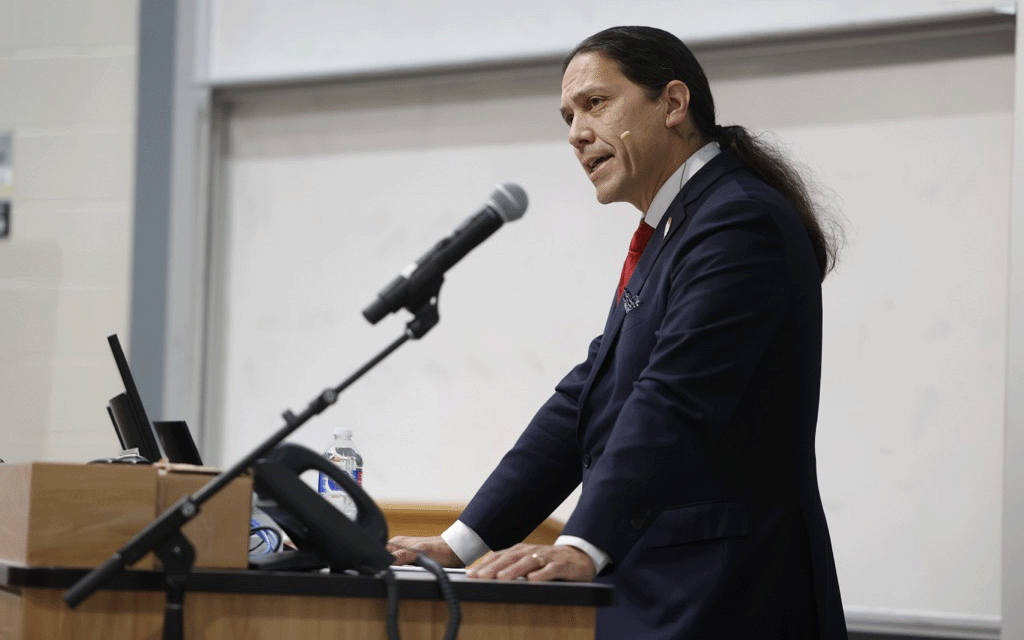
CEO and President of First Nations Bank of Canada, Bill Lomax, headlines the 2024 Dean's Speaker Series
The Edwards School of Business Dean’s Speaker Series showcases inspiring business professionals from around the world. Armed with knowledge and practical experience, these leaders continue to make stellar impact on our communities.
To inspire students, alumni and the community, Edwards kickstarts each new school year with the Dean’s Speaker Series. This fall, the series has featured Bill Lomax as the speaker.
Bill’s talk, titled “Indigenous Financial Nation Building and the Future of Indigenous Business,” discusses how the business landscape in Canada has changed for Indigenous people, emphasizing their growing ambitions, capacity and participation in business compared to previous decades. As a leader of First Nations Bank of Canada (FNBC), the only Indigenous-owned bank in Canada, he shares key factors that have contributed to building financial capacity for Indigenous people and communities.
Bill grew up in Terrace, British Columbia and is a proud member of the Gitxsan Nation. He graduated with a law degree at the University of British Columbia and began his career as a lawyer, facilitating land negotiations for the British Columbia Treaty Commission. However, he realized that while Indigenous nations were coming into financial resources, they lacked financial leaders to support and guide them. Recognizing this gap, he moved on to pursue his MBA at Columbia University to deepen his understanding of finance as a tool for nation building. He continued to spend 20 years in the United States in the investment sector, working for firms such as Merrill Lynch and Goldman Sachs.
He had expected to spend the entirety of his career in the United States but received an opportunity to return to Canada and lead FNBC. When he reflected on the job opportunity, he found it be an easy decision to accept as it would allow him to apply his expertise and significantly contribute to the financial success of First Nations. He found the call to be of great purpose, palpable, and valued it beyond monetary compensation.
Established 28 years ago, FNBC is still standing and has grown to operate 21 full-service branches and service centres nationwide and is committed to expanding by opening new branches to provide essential financial services such as capital, financial information, strategies and literacy to Indigenous people and communities. This expansion has not only enhanced financial access but also plays a crucial role in building the economic foundations of Indigenous communities.
At the same time, FNBC recognizes that many Indigenous people, historically may have felt unwelcomed in traditional banks. By fostering an inclusive environment where Indigenous people feel valued and supported, it further empowers them to pursue financial literacy and support.
Together these efforts contribute to the financial nation building of Indigenous communities, equipping them with the tools and confidence needed for sustainable economic growth.
Lomax emphasizes that in recent years, Indigenous people have witnessed a significant shift in their financial landscape, with deals now worth millions of dollars. He describes this period as the “opportunity revolution,” a time when Indigenous communities have more opportunities than ever before. This new reality enables Indigenous communities to consider security for their families and the overall vitality of their communities.
A key example of this shift is FNBC’s recent achievement in securing a significant deal with the Canada Infrastructure Bank for $100 million to allow Indigenous communities to build infrastructure at below-market rates. Lomax underscores the need for self-sufficiency, stating, “if we wait for the Feds to build schools or build an arena, it's going to take 20 years. If we do it ourselves, we can do it in one or two years.”
In closing, Lomax encourages everyone to share in the dreams of First Nations and engage with Indigenous people in the opportunity revolution. He notes that development and partnerships with First Nations are among the most promising opportunities in Canada. However, there is still work to be done to build capacity, improve access to education and wealth in Indigenous communities.
Lomax asserts, that “this is not just about economic reconciliation; it's about building a better, more inclusive, and more prosperous Canada for us all.”
“Thank you for demonstrating what leadership is through your visionary approach to Indigenous nation building,” said Edwards School of Business, Acting Dean, Dr. Marjorie Delbaere (PhD). “Your commitment to Indigenous financial development has opened pathways for economic growth and opportunity for Indigenous people and communities.”
If you want to get involved with Edwards or want to stay up to date with future events, please contact Carlee Snow, Alumni Engagement Officer, at alumni@edwards.usask.ca.
Watch Bill Lomax’s presentation here or listen via podcast.
